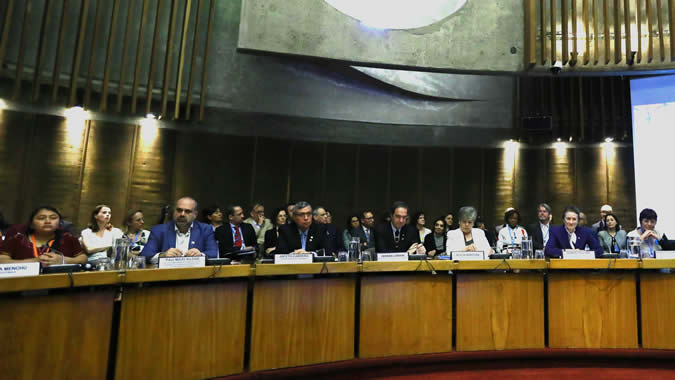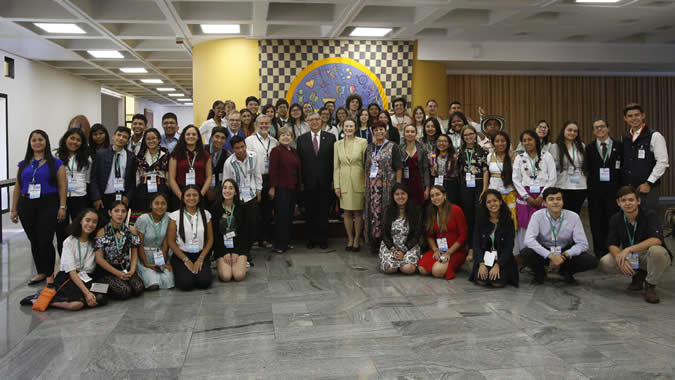First Dialogue Between Authorities, Experts and Young People, Organized by UNICEF and ECLAC, Reaffirms the Urgency and Relevance of Guaranteeing, Protecting and Promoting the Rights of Boys, Girls and Adolescents
Work area(s)
The event “On the road to equality: 30 years of the Convention on the Rights of the Child” was inaugurated today at ECLAC’s central headquarters in Santiago, Chile.

Authorities, international officials and young people from Latin America and the Caribbean reaffirmed today the urgency of guaranteeing, protecting and promoting the rights of boys, girls and adolescents at the first regional dialogue “On the road to equality: 30 years of the Convention on the Rights of the Child”, which is being held through Thursday, November 29, at the central headquarters of the Economic Commission for Latin America and the Caribbean (ECLAC) in Santiago, Chile.
The gathering, organized by ECLAC and the Regional Office for Latin America and the Caribbean of the United Nations Children’s Fund (UNICEF), was inaugurated by Paula-Mae Weekes, the President of Trinidad and Tobago, who sent greetings via videoconference; Jafeth Cabrera, the Vice President of Guatemala; Hernán Larraín, Chile’s Minister of Justice and Human Rights; Alicia Bárcena, ECLAC’s Executive Secretary; and Henrietta Fore, Executive Director of UNICEF.
Other speakers included María Cristina Perceval, UNICEF’s Regional Director for Latin America and the Caribbean; Pau Marí-Klose, the Spanish government’s High Commissioner for the Fight against Child Poverty; and the young Guatemalan Gilda Menchú, on behalf of the adolescents attending the dialogue.
In a speech made via videoconference from ECLAC’s Subregional Headquarters in Port of Spain, the President of Trinidad and Tobago, Paula-Mae Weekes, affirmed that there are shared challenges in the region, such as underdevelopment, that undermine efforts to give effect to the rights established in the Convention.
The President indicated that although there are still thousands of children who do not access education, the vast majority of Caribbean islands provide access to free primary and secondary schooling. In Trinidad and Tobago, she noted, that opportunity continues through to postsecondary education.
“We recognize that there is still much to be done in the Caribbean. The future of our nations lies with our children; we must protect them,” she stated.
Meanwhile, in his remarks, Guatemalan Vice President Jafeth Cabrera acknowledged that his country faces challenges to guaranteeing the rights of childhood; however, he emphasized that “we are on the path of devising a roadmap that truly changes our country.”
Hernán Larraín, Chile’s Minister of Justice and Human Rights, said that the best homage his country can pay to the Convention on the Rights of the Child’s 30 years in existence is to guarantee that its tenets are fully complied with.
“We want the principle of the best interests of the child to be a tangible reality for every boy, every girl, every adolescent. We must take advantage of the opportunity to reaffirm as a State, and as a country, our commitment to childhood,” he indicated.
Alicia Bárcena, ECLAC’s Executive Secretary, highlighted that, since its approval in 1989, the Convention on the Rights of the Child has been ratified by all the countries in Latin America and the Caribbean, demonstrating the region’s deep commitment to the fundamental values of childhood.
The senior United Nations official recalled that Latin America and the Caribbean is one of the youngest regions on the planet, with 163 million people between 15 and 29 years of age. This, she said, constitutes a unique opportunity for building more dynamic, inclusive and equitable societies that give opportunities to men and women alike.
In the framework of the dialogue’s inauguration, ECLAC’s top representative presented the document Latin America and the Caribbean 30 years after the adoption of the Convention on the Rights of the Child, produced jointly with UNICEF, which examines progress and pending challenges regarding the main indicators for a selection of ten rights contained in the Convention.
“Poverty has the face of a child because, despite the achievements made in recent years, it continues affecting boys, girls and adolescents from 0 to 14 years of age to a greater extent, moving from 60% in 2002 to 47% to 2016,” she warned.
In addition, she highlighted that the prevalence of child labor has declined in Latin America and the Caribbean, falling from 10.8% in 2008 to 7.3% in 2016. However, she said that boys, girls and adolescents continue to be victims of high levels of violence: every day 67 adolescents die as a result of homicide.
“Making the pending issues regarding Latin American and Caribbean childhood visible is a call to coordinated action and to the design and implementation of universal and inclusive social policies, so that all boys and girls who are born with the same inalienable rights are able to exercise them, regardless of the conditions of their birth,” Alicia Bárcena sustained.
Meanwhile, Henrietta Fore, UNICEF’s Executive Director, called on countries to translate the Convention’s rights into results.
“We have seen significant progress that has been reflected in the daily lives of boys, girls and adolescents. However, challenges remain, such as poverty, inequality and climate change,” she stated.
In her remarks, María Cristina Perceval indicated that equality as the end goal of development starts with equality of conditions, opportunities and treatment for boys, girls and adolescents.
“Working for equality in childhood is decisive for consolidating democracy and the future of humanity,” she added.
Pau Marí-Klose, the Spanish government’s High Commissioner for the Fight against Child Poverty, stated that economic development can contribute, but it is not enough to guarantee the development of boys, girls and adolescents.
Finally, on behalf of the adolescents attending the dialogue, the young Guatemalan woman Gilda Menchú called on authorities to look closely at the reality of children in the region.
“If you walk along the streets of Latin America and the Caribbean, you will see boys, girls and adolescents in conditions that violate their rights. We do not want to be victims anymore, we want to be the protagonists who transform and guarantee a better quality of life for childhood and adolescence in Latin America and the Caribbean,” she said.
Related content

Young People from the Americas Urge for Breaking the Cycle of Inequality with a View to Achieving the 2030 Agenda
In the framework of the Concausa 2030 initiative, organized by ECLAC, UNICEF and América Solidaria, some 50 adolescents from 16 countries in the Americas unveiled today their proposals for overcoming…
Country(ies)
- Latin America and the Caribbean
Related project(s)
Contact
Public Information Unit
- prensa@cepal.org
- (56 2) 2210 2040